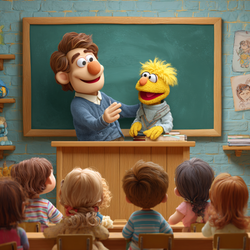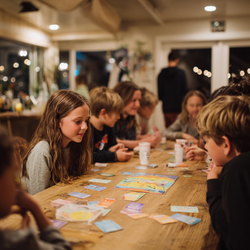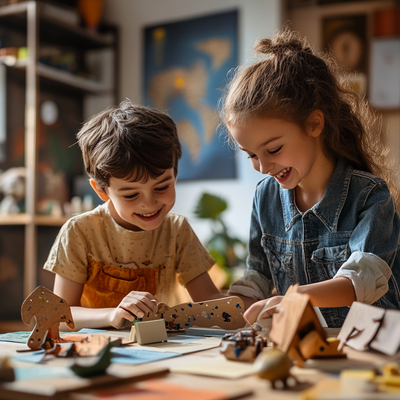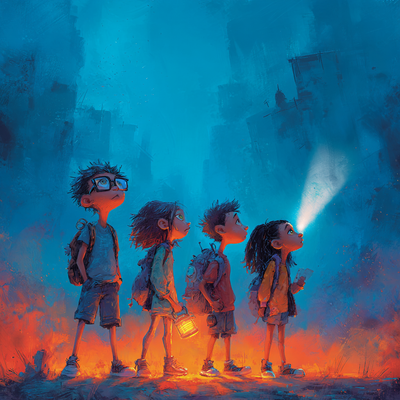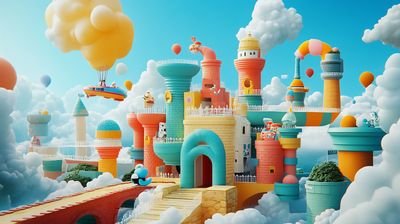Found myself refereeing a heated argument between two eight-year-olds about the "right" way to build a human pyramid yesterday. Apparently Tyler thought Emma was doing it wrong. Emma thought Tyler was being bossy. Neither of them wanted to compromise.
So much for building teamwork through fun games.
But fifteen minutes later they were working together perfectly on the next activity, acting like best friends. Kids are weird like that.
Teamwork games either create amazing moments of cooperation or complete disasters of arguing and hurt feelings. Sometimes both in the same afternoon. Never really know which way it's going to go until you're in the middle of it.
The Great Balloon Disaster
Tried this game where teams had to keep balloons in the air using only their breath. No hands, no touching, just teamwork and lung power.
Seemed simple enough. Divide into teams, give each team colored balloons, see which group could keep theirs up longest.
What I didn't anticipate was how competitive third-graders would get about balloon strategy.
"You're blowing wrong!" "That's not teamwork!" "Why isn't anyone helping with the red one?"
One team developed this elaborate system where kids took turns blowing while others directed traffic. Another team just had everyone blowing frantically in all directions.
Guess which strategy worked better?
The organized team kept their balloons up for three minutes. The chaos team lasted about thirty seconds before dissolving into accusations and blame.
But here's the weird part - the chaos team had way more fun. They were laughing and silly and didn't care that they "lost." The organized team was stressed about doing it right.
Which group actually learned more about teamwork? Still not sure.
Human Knots: The Physical Therapy Session I Didn't Plan
Classic teamwork game, right? Everyone grabs hands in a circle, then tries to untangle themselves without letting go.
Works great with adults who understand concepts like "communication" and "patience."
With kids? Different story.
First attempt lasted about two minutes before someone started crying because their arm was twisted weird. Second attempt ended when Jake decided the fastest solution was to crawl under everyone, creating an even bigger tangle.
Third attempt actually worked, but only because I simplified the rules and let them switch hands if someone was genuinely uncomfortable.
Kids loved the challenge once we made it less about perfect execution and more about problem-solving together.
But I spent the rest of the afternoon worried that someone's parent would ask why their kid came home with rope burn on their wrists.
Tower Building: Architecture Meets Chaos
Give teams random supplies - cups, tape, straws, whatever - and challenge them to build the tallest tower.
Sounds educational. Engineering principles, cooperation, creative problem-solving.
Reality: pure chaos with occasional moments of accidental teamwork.
Team one spent fifteen minutes arguing about foundation design. Team two built three different towers because they couldn't agree on one plan. Team three had Sarah taking charge and basically building the whole thing herself while everyone else watched.
But team four? Magic happened. They talked through ideas, tried different approaches, helped each other when things fell down. Their tower wasn't tallest, but their cooperation was beautiful to watch.
Made me realize that teamwork games don't create teamwork - they reveal which kids already understand cooperation and which ones need more practice.
Relay Races: Where Everything Goes Wrong
Planned these elaborate relay stations. Kids work together to complete challenges at each station before moving to the next one.
Station one: build a puzzle together. Station two: carry water balloons without dropping them. Station three: spell words as a team.
First team through finished in twelve minutes. Last team took thirty-seven minutes because they kept stopping to argue about strategy.
But the slow team was having deep conversations about each challenge. "What if we try this?" "That's a good idea!" "Let's help Marcus with the hard pieces."
Fast team was efficient but not really connecting. Slow team was building actual relationships while solving problems.
Which outcome was more valuable? Depends on what you're trying to accomplish.
Circle Games That Actually Work
Some of the best teamwork happens in simple circle games where everyone has to pay attention to each other.
Tried this rhythm clapping game where each person adds one clap to a pattern, and the whole circle has to stay together.
Starts easy. Gets complicated fast when you have twelve kids trying to stay synchronized.
But something magical happens when they get it right. Everyone focused on each other, listening carefully, adjusting their timing to match the group.
Takes patience though. And tolerance for lots of mistakes and restarting. Some kids get frustrated when the rhythm falls apart for the eighth time.
But when it works, you can see them understanding what cooperation actually feels like.
Trust Games: The Liability Nightmare
Trust falls seemed like a good idea until I imagined explaining to parents why their kid got hurt playing "trust" games at church.
Switched to less dramatic trust activities. Partner walks with eyes closed while other person gives directions. Trust circles where kids stand in small circles and lean in together.
Still requires serious safety monitoring. Some kids take it too seriously and others think it's hilarious to give wrong directions or let people fall.
But done carefully, trust games create moments where kids have to actually depend on each other. Forces them to communicate clearly and pay attention to their partner's needs.
Just requires way more supervision than I originally expected.
Problem-Solving Challenges That Backfire
Gave teams this challenge: get everyone across an imaginary river using only two "stones" (paper plates) that they had to step on.
Classic team-building exercise. Requires planning, communication, helping each other.
Team one figured it out in five minutes through careful planning and taking turns.
Team two spent twenty minutes arguing about who should go first and whether the rules were fair.
Team three had Marcus trying to carry Emma across in one giant leap, which ended with both of them on the floor laughing.
Sometimes the "wrong" solutions create better memories than the right ones.
Games That Accidentally Work
Best teamwork moment happened during a game I thought would be a simple time-killer.
Kids had to arrange themselves in birthday order without talking. Just hand gestures and creative communication.
Seemed like an easy five-minute activity.
Turned into fifteen minutes of kids really paying attention to each other, figuring out creative ways to communicate dates, helping kids who were struggling with the concept.
Watching them develop their own sign language and include everyone in the process - that was teamwork happening naturally instead of being forced.
Sometimes the best cooperation emerges when kids forget they're supposed to be learning teamwork.
The Competitive vs Cooperative Balance
Some kids are so competitive that teamwork games become individual contests where teammates are just obstacles.
Others are so cooperative they won't make decisions or take initiative because they don't want to seem bossy.
Finding games that balance both impulses is tricky.
Games where teams compete against challenges instead of each other work better. Everyone trying to beat the clock or accomplish something difficult together.
Takes pressure off interpersonal competition and redirects energy toward shared problem-solving.
But you still get kids who want to be team captain and kids who just want to follow directions. Managing different personality types while keeping everyone engaged is its own challenge.
Finding Games That Work
When looking for Youth Group Games that actually build teamwork instead of just creating chaos, the key is finding activities where cooperation is necessary, not optional.
Found READY, SET, RACE recently - relay-style event designed around teams working together to complete challenges. Type of competition where you can't succeed without actual cooperation. Way better than games where one kid can dominate while everyone else watches.
What Actually Builds Teamwork
Honest moments where kids have to depend on each other. Not artificial team-building exercises, but real situations where cooperation matters.
Cleaning up together after messy activities. Helping carry heavy things. Working together when something goes wrong.
Kids learn teamwork better from real life situations than from designed games.
But games can create opportunities for those real moments to happen. Especially when things don't go according to plan and kids have to figure out solutions together.
The best teamwork learning happens in the gaps between planned activities. When kids naturally start helping each other or solving problems without being told to cooperate.
Resources That Get It Right
Some curriculum companies understand that teamwork can't be forced, only encouraged.
Orange has activities that create natural cooperation opportunities instead of artificial team-building exercises.
Kids Sunday School Place keeps teamwork games simple and focused on connection rather than competition.
Group's DIG IN has good ideas for age-appropriate cooperation activities that actually work with real kids in real timeframes.
Gospel Project includes biblical examples of cooperation that give context for why teamwork matters.
But best teamwork activities come from understanding your specific group dynamics and what kinds of cooperation challenges they actually need practice with.
What I Know About Cooperation
Real teamwork is messy and takes time. Kids have to practice failing together before they can succeed together.
Some kids naturally cooperate. Others need lots of guidance and structure. Most fall somewhere in between depending on the day and the activity.
Competition can motivate or destroy teamwork depending on how it's set up. Teams competing against challenges work better than teams competing against each other.
Simple games often work better than elaborate ones. Less rules to argue about, more focus on actual cooperation.
Talking about teamwork helps, but practicing it helps more. Kids need opportunities to experience what good cooperation feels like.
And sometimes the disasters teach more about working together than the successes do.
When games fall apart and kids have to figure out how to fix things together - that's when real teamwork learning happens.
Watch YouTube
Listen to Podcast



